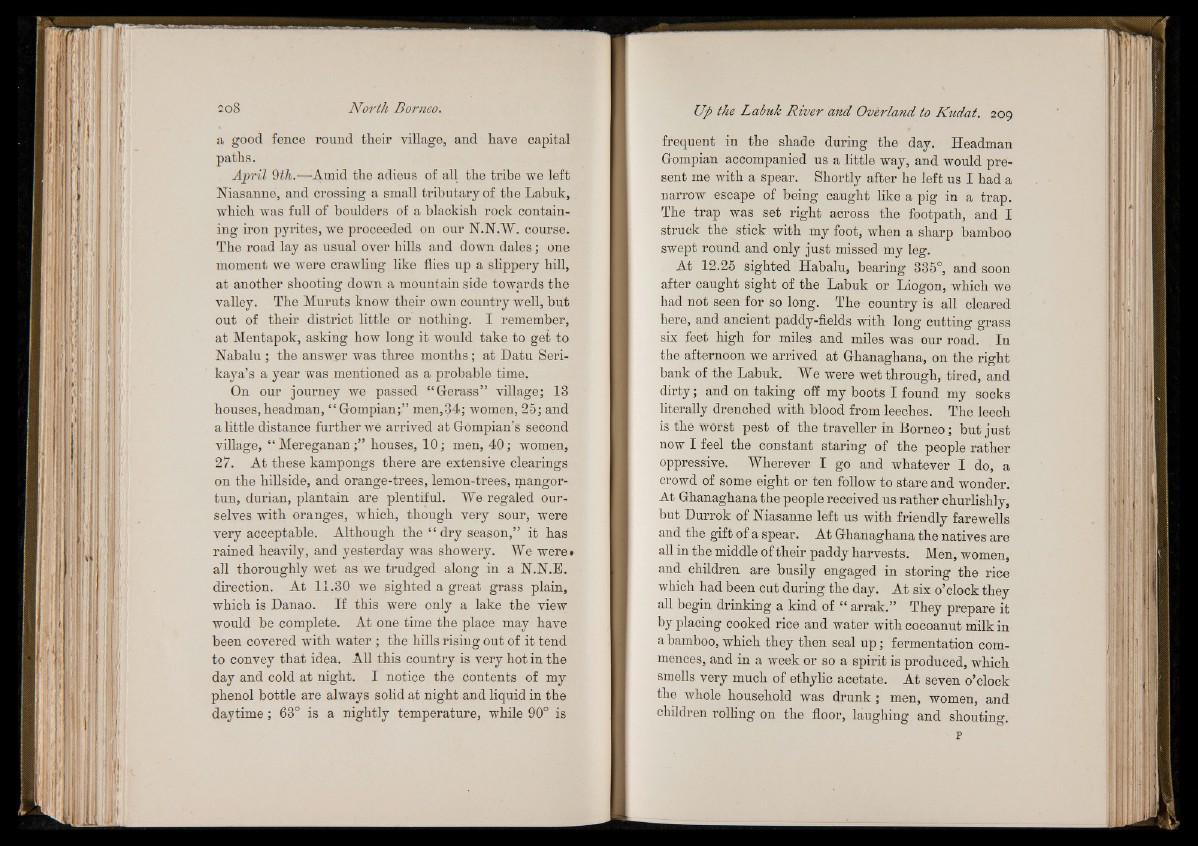
a good fence round their village, and have capital
paths.
April 9th. Ami d the adieus of all the tribe we left
Niasanne, and crossing a small tributary of the Labuk,
which was full of boulders of a blackish rock containing
iron pyrites, we proceeded on our N.N.W. course.
The road lay as usual over hills and down dales ; one
moment we were crawling like flies up a slippery hill,
at another shooting down a mountain side towards the
valley. The Muruts know their own country well, but
out of their district little or nothing. I remember,
at Mentapok, asking how long it would take to get to
Nabalu ; the answer was three months ; at Datu Seri-
kaya’s a year was mentioned as a probable time,
On our journey we passed “ Gerass” village; 13
houses, headman, “ Gompian;” men,34; women, 25; and
a little distance further we arrived at Gompian’s second
village, “ Mereganan;” houses, 10; men, 40; women,
27. At these kampongs there are extensive clearings
on the hillside, and orange-trees, lemon-trees, mangor-
tun, durian, plantain are plentiful. We regaled ourselves
with oranges, which, though very sour, were
very acceptable. Although the “ dry season,” it has
rained heavily, and yesterday was showery. We were»
all thoroughly wet as we trudged along in a N.N.E.
direction. At 11.30 we sighted a great grass plain,
which is Danao. If this were only a lake the view
would be complete. At one time the place may have
been covered with water ; the hills rising out of it tend
to convey that idea. All this country is very hot in the
day and cold at night. I notice the contents of my
phenol bottle are always solid at night and liquid in the
daytime; 63° is a nightly temperature, while 90° is
frequent in the shade during the day. Headman
Gompian accompanied us a little way, and would present
me with a spear. Shortly after he left us I had a
narrow escape of being caught like a pig in a trap.
The trap was set right across the footpath, and I
struck the stick with my foot, when a sharp bamboo
swept round and only just missed my leg.
At 12.25 sighted Habalu, bearing 335°, and soon
after caught sight of the Labuk or Liogon, which we
had not seen for so long. The country is all cleared
here, and ancient paddy-fields with long cutting grass
six feet high for miles and miles was our road. In
the afternoon we arrived at Ghanaghana, on the right
bank of the Labuk. We were wet through, tired, and
dirty; and on taking off my boots I found my socks
literally drenched with blood from leeches. The leech
is the worst pest of the traveller in Borneo; but just
now I feel the constant staring of the people rather
oppressive, Wherever I go and whatever I do, a
crowd of some eight or ten follow to stare and wonder.
At Ghanaghana the people received us rather churlishly,
but Durrok of Niasanne left us with friendly farewells
and the gift of a spear. At Ghanaghana the natives are
all in the middle of their paddy harvests. Men, women,
and children are busily engaged in storing the rice
which had been cut during the day. At six o’clock they
all begin drinking a kind of “ arrak.” They prepare it
by placing cooked rice and water with cocoanut milk in
a bamboo, which they then seal u p ; fermentation commences,
and in a week or so a spirit is produced, which
smells very much of ethylic acetate. At seven o’clock
the whole household was d ru n k ; men, women, and
children rolling on the floor, laughing and shouting.
p